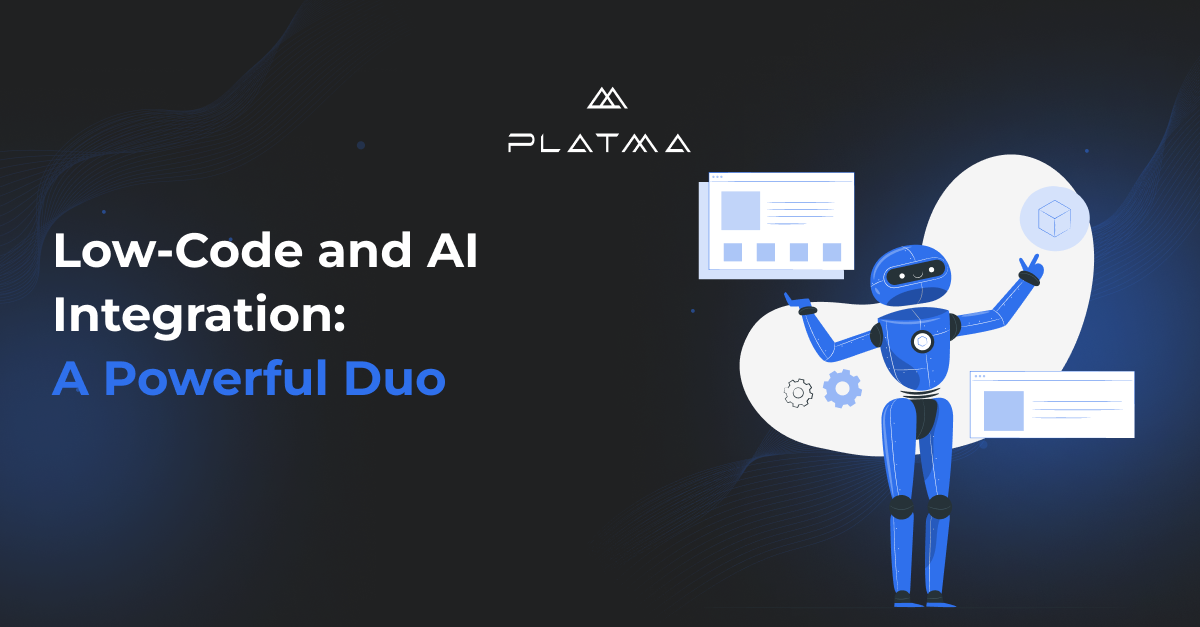In the fast-paced world of modern software development, efficiency and innovation are paramount. This is where low-code development platforms have emerged as a game-changer. Low-code platforms like PLATMA offer businesses the ability to develop applications quickly with minimal hand-coding, enabling them to respond swiftly to evolving market demands. However, the integration of Artificial Intelligence (AI) with low-code platforms takes this synergy to an entirely new level, creating a powerful duo that drives automation, intelligence, and rapid application development.
The Rise of Low-Code Development
Low-code development platforms have gained immense popularity due to their ability to streamline the software development process. These platforms allow both professional developers and non-developers to create applications using visual interfaces and pre-built components. With low-code, organizations can reduce development time, costs, and the need for extensive coding expertise.
PLATMA, as a leading low-code platform, has been at the forefront of this revolution. It empowers organizations to build applications rapidly, enabling them to stay competitive in today’s digital landscape. However, when low-code meets AI, the possibilities become limitless.
The Power of AI Integration
Artificial Intelligence has become a cornerstone of digital transformation. Its ability to analyze vast amounts of data, make predictions, and automate complex tasks has revolutionized industries across the board. Integrating AI with low-code platforms like PLATMA enhances the capabilities and potential use cases exponentially. Here’s how:
Enhanced Automation: AI-driven automation can be seamlessly integrated into low-code applications. This means processes that were once manual and time-consuming can now be automated with ease. For example, customer service chatbots, intelligent data extraction, and predictive analytics can all be incorporated into applications built on PLATMA.
Smarter Decision-Making: With AI’s predictive and prescriptive analytics capabilities, low-code applications can make real-time, data-driven decisions. This is invaluable in scenarios like financial forecasting, inventory management, and healthcare diagnostics, where timely and accurate decisions can be critical.
Natural Language Processing (NLP): AI-powered NLP can be integrated into low-code applications to enable natural language understanding and communication. This opens up possibilities for building sophisticated chatbots, virtual assistants, and language translation tools that can be created with minimal coding.
Image and Video Recognition: Integrating AI models for image and video recognition into low-code applications can revolutionize industries such as retail, healthcare, and manufacturing. For instance, PLATMA-powered applications can quickly identify defects in manufacturing processes or analyze medical images for diagnoses.
Personalization: AI-driven recommendation engines can provide highly personalized experiences in applications developed with PLATMA. This can enhance user engagement and satisfaction across various domains, from e-commerce to content delivery.
Challenges and Considerations
While the integration of AI and low-code offers tremendous advantages, it’s essential to address a few key considerations:
- Data Quality: The success of AI relies heavily on the quality of data. Ensuring clean, accurate, and relevant data is essential for the effectiveness of AI-powered low-code applications.
- Expertise: While low-code platforms democratize development, some AI integration tasks may still require specialized knowledge. Organizations should invest in training or collaborate with AI experts as needed.
- Security and Compliance: When dealing with sensitive data, security and compliance are paramount. Ensure that AI-powered low-code applications meet the necessary security and regulatory standards.
The marriage of low-code development and artificial intelligence is a match made in heaven for organizations looking to stay competitive in the digital age. PLATMA and similar low-code platforms empower businesses to harness the power of AI without the need for extensive coding expertise. The result is faster application development, enhanced automation, smarter decision-making, and a more personalized user experience. As technology continues to evolve, the low-code and AI integration trend is set to redefine the way we develop and deploy applications, opening up new horizons for innovation and efficiency. Embrace this powerful duo to drive your organization’s success in the digital era.






